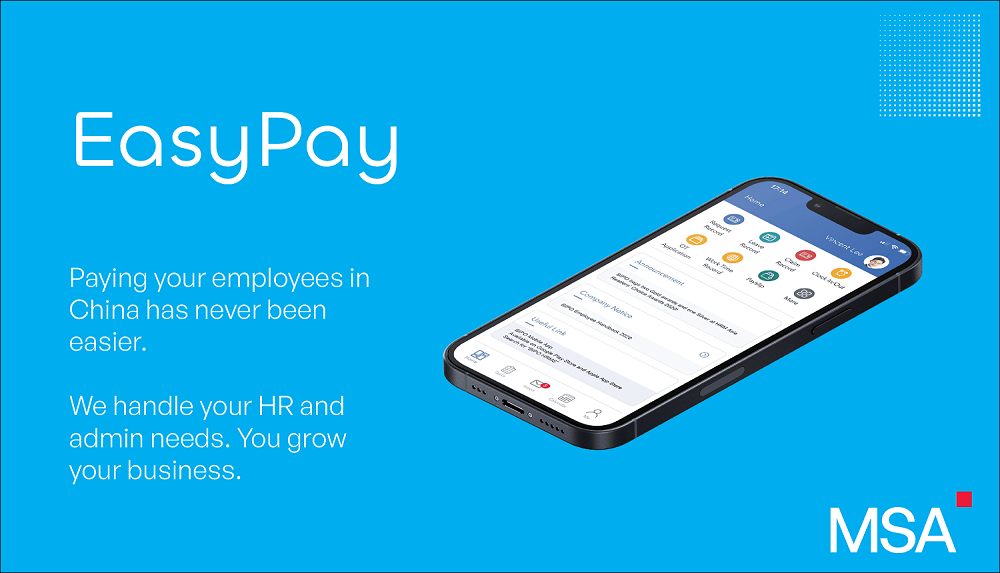Whether planning to expand your business or establish a new operation in Asia, China has been regarded as a prominent location for business growth over the past two decades. Despite the uncertainties and challenges posed by COVID-19, China has been lauded for its resilient economic recovery and performance.
According to the latest official data released by China’s National Bureau of Statistics, China’s economy grew 8.1% from last year. Even before the pandemic, the Chinese market had been seen as a crucial market for multinational companies and SMEs seeking business growth and opportunities. Additionally, as an indicator of their tremendous economic activity, China has been the largest exporter of goods since 2009 and is the world’s second-largest importer.
For businesses intending to operate in China, setting up and managing a payroll is one thing that makes it easy to establish a business and begin operations in the country. Here is what you need to know on how to set up and manage payroll in China:
WHAT IS A PAYROLL?
Payroll is a series of activities involving compensating employees for a set period or a given date. These activities include calculating total wages or earnings, calculating taxes and other deductions to be withheld, arranging monetary payments, and, in most cases, filing taxes. Payroll is a list of people an employer needs to compensate based on work completed or services rendered.
Payroll is usually managed by an accountant, bookkeeper, or a business’s allocated human resources administrator. Larger companies, especially those with a large number of employees, consultants, contractors, and other laborers, have a specific department dedicated to payroll activities. In certain cases, major companies even have internal software or systems developed specifically to manage their monthly payroll.
PAYROLL LAWS
China has a complex legal framework that ensures employees a range of rights and protections, which are:
- Right to earn minimum wage
- Right to have a formal employment contract
- Right to work a maximum of 40 hours a week, with fixed overtime rates
- Right to secure a housing fund
- Right to have annual leave
- Right to have social welfare that covers pensions, healthcare, and unemployment.
THE SOCIAL WELFARE SYSTEM IN CHINA
The social welfare system in China consists of mandatory social security contributions to government-run funds. Both the employer and the employee make the contributions, which are withheld by the employer every month.
These mandatory contributions from the employer and employee can vary depending on the city you intend to establish as your new business location. These contributions are withheld to the following social security funds, namely:
- Medical benefits
- Maternity benefits
- Occupational injury compensation
- Pension fund, and
- Unemployment insurance fund
The housing fund is not considered a type of social welfare, but it is a mandatory contribution (optional for foreign employees working in China); as such, it is informally referred to as a type of social security. The housing fund operates similarly to a 401(k).
The portion contributed by an employer is typically higher than that of the employee. Employers usually contribute between 5 and 25 percent of the employee’s annual salary, which can be adjusted or negotiated with the employee during the hiring process.
TAXATION IN CHINA
China has a progressive income tax system ranging from 3% to 45% based on the employee’s wage bracket. The Individual Income Tax Law (or IIT) applies to Chinese employees and foreign nationals who live in China or are compensated by a China-based business.
The preferential individual income tax policy allows foreign employees to enjoy supplementary tax-deductible benefits (relating to children’s educational costs, parental support, home rental expenses, critical illness, and more).
Employers withhold employee taxes, which are then paid to the tax bureau before the 15th of every month. Share tax, bonus tax, or severance tax will also be withheld when applicable.
SETTING UP AND MANAGING YOUR BUSINESS PAYROLL IN CHINA
When processing payroll for your business in China, payment to employees must be made in the country’s official currency, the Chinese yuan.
You are also legally mandated to have a strong written employment contract that details contracted work and equivalent pay, overtime rates, social security benefits, and other mandatory contributions to be withheld.
An employment contract in China should include other entitlements, such as the number of personal and medical leave days allocated. This is to ensure that both you and your employees have come to terms and agreed on compensation, benefits, and legal terms should there be a disruption in the employment relationship, such as termination or resignation. For example, an employee in China is allowed up to 12 months of sick leave with pay if the illness or accident is work-related. While there is no need for a formal notice to fire an employee with cause, it is required by law to provide a 30-day notice to an employee who is to be terminated without cause.
To hire employees legally and be able to pay them, you will be required to have an entity in China. This would further require your business to hire human resources staff dedicated to payroll management or outsource it to an external partner who understands the complexity of Chinese employment and compliance laws.
ADVANTAGES OF OUTSOURCING PAYROLL
1. Enhanced productivity
Outsourcing payroll enables employers and managers to free up valuable time, allowing them to dedicate their resources and efforts to more strategic, high-impact tasks.
2. Cost-savings
Working with a payroll provider can greatly reduce organizations’ payroll processing costs. This is especially pertinent for small and medium-sized businesses with limited resources and money.
3. Heightened security for data
Given the complex nature of payroll processing, the risk of data breach remains present when using in-house processes and software. Outsourcing payroll mitigates the risk associated with compromising activities such as embezzlement and identity theft in cases where confidential information is misused.
4. Access to experts in the field
Outsourcing payroll gives businesses access to and allows them to use highly trained experts who can execute duties under changing regulatory environments and payroll systems.
5. Prevent mistakes and penalties
Given the experience and expertise of dedicated payroll teams, outsourcing payroll administration can eliminate the high and unnecessary costs associated with incorrect payments and filings.
Nowadays, some service providers specifically offer accounting and payroll management services, among other things. Even if you are a small business owner with under ten employees, there will always be an external payroll provider who can specifically offer services unique to the business. These services include software allowing you to keep a precise number of hours worked, worker classifications, and salary rates. Some also offer assistance in filing documentation and taxes and dealing with government agencies and other regulators.
FINAL THOUGHTS
Using an outsourced payroll service provider allows you to focus on other important aspects of the business without managing the internal payroll. Due to the existence of service-level agreements tied to the type of managed payroll service you enlist, the risks of paying employees and other workers are significantly reduced because of the assurance that everyone gets paid on the contracted date each time. Payroll service providers also perform such services under regulatory compliance, which helps you save money compared to internalizing this function.
PAYROLL MANAGEMENT IN CHINA
Having been established and operational in China for over a decade, MSA has helped numerous companies with their payroll and tax administration needs. Distinguished for our emphasis on delivering high quality, our long list of clients extends across different industries and sectors all over China. Contact us today and let our consultants help you with your business needs.




